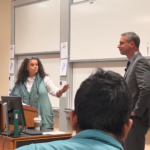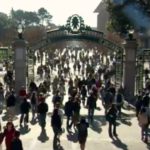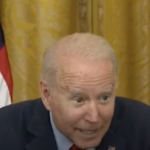David Axelrod: Red Diaper Baby?
Several times I’ve written for The American Spectator on the person of David Axelrod, the figure most responsible for giving America two terms of Barack Obama. My first piece was a cover feature for the March 2012 print edition, titled, “David Axelrod, Lefty Lumberjack.” This lengthy profile was followed by an August 2012 piece titled, “All in the (Political) Family.” Then followed still more writings on Axelrod and friends, particularly the new material I reported in my book on Obama’s communist mentor, Frank Marshall Davis.
These writings got a lot of attention. I discussed the topic a number of times in interviews. People were shocked, and they wanted more. What other skeletons lay in David Axelrod’s political-ideological closet?
I dug into all of the declassified archival documents and old Congressional investigative reports at my disposal. But even then, what I could find was limited by what Axelrod would divulge, and because liberal “journalists” who had profiled Axelrod’s background never dared to raise any red flags from the past of our president’s chief image-maker. Like Obama himself, Obama’s molder and shaper had to be protected by liberal “journalists.”
One crucial opening amid the Axelrod roadblocks came with the death of Axelrod’s mother a little over a year ago, which led to the funeral home posting a bio that finally resolved the remarkably elusive question of the names of her parents and grandparents and other strangely absent information. I reported on this in an April 2014 piece for The American Spectator, titled, “The Quest for David Axelrod’s Leftist Roots.”
Well, now comes another open window: the publication of Axelrod’s memoirs, titled, Believer: My Forty Years in Politics, which contain some things I totally did not expect, namely in the person of Axelrod’s father. Those things prompt me now to write this article.
Before getting to the new things in Believer, here’s a brief summary of what I’ve previously reported on Axelrod’s upbringing:
David Axelrod was born and raised in New York in February 1955 before moving to Chicago in the 1970s to attend college and begin a professional path that would take him into journalism, political campaigns, and eventually the bosom of Barack Hussein Obama. In a very interesting twist of fate in Chicago, Axelrod (like Obama) had his own mentors there — namely, in the Canter family.
The Canters were old hardline pro-Soviet communists, so much so that the senior Canter, Harry Jacob Canter, was actually brought to Moscow during the height of the Stalin period to work for the Soviet government as an official translator of Lenin’s writings. Harry was active in the old Industrial Workers of the World and had been secretary of the Boston Communist Party. He was not shy about his political enthusiasm. In 1930, he ran for governor of Massachusetts on the Communist Party ticket. After that, he sojourned to the Motherland, taking his entire family to Moscow with him, including his son David, who one day would come know David Axelrod.
The Canter family returned to America (Chicago, where the Communist Party was founded in 1919) in the 1940s. In an amazing irony, the Canters actually knew and worked with Obama’s old communist mentor, Frank Marshall Davis. I even found the Canter names in Davis’s communist newspaper, The Chicago Star. Remarkably, one of the Canters was on the board of a group called the Progressive Publishing Co., which purchased the Star from Davis in 1948, helping grease the skids for Davis’s departure for Hawaii, where he would eventually meet a young Obama.
(For the record, as I’ve noted separately, Davis — again, Obama’s mentor — also knew and worked with Valerie Jarrett’s grandfather and father-in-law in Communist Party/left-wing circles in Chicago in the 1940s.)
The Canter family member who knew David Axelrod best was David Canter. He and another old communist maneuverer from Chicago named Don Rose would mentor David Axelrod and help him secure his first major newspaper jobs at the Hyde Park Herald and then the Chicago Tribune. Axelrod is the first to admit that those jobs launched him.
David Canter and Don Rose did lots of far-left work throughout the 1960s and into the 1970s, associating with all sorts of radical organizations and suspected communist front groups. Rose was so important to Axelrod that even liberal journalists who have profiled Axelrod cannot and do not ignore noting that Rose was a mentor, minus (of course) any inconvenient details about communism.
In short, the Canters and Don Rose were instrumental influences outside of David Axelrod’s family. As for Axelrod’s family, the political-ideological story centers around his mother, Myril, and his father, Joseph.
Politically and ideologically speaking, there has always been more information available on Axelrod’s mother than his father. Myril in the 1940s worked for a prominent left-wing New York daily, PM. The publication was a battleground between non-communist liberals/progressives and closet communists who masqueraded as liberals/progressives. It was heavily penetrated by Communist Party USA members literally sworn to Stalin’s Soviet Union and the Moscow line. The self-proclaimed “liberals/progressives” at PM ranged from Arthur Miller to I. F. Stone, both of whom, we now know, had been communists in the 1930s and perhaps into the 1940s. The famed Arthur Miller was at least a small “c” communist who — as shown by Congress in the 1950s — had applied to join the Communist Party. Miller (we now know) wrote for the Daily Worker and New Masses under pseudonyms. As for Stone, he had been a literal Soviet spy in the late 1930s, though he later came to reject the USSR and became a non-communist leftist of some sort.
Where were Myril’s sympathies? Though I still cannot say with absolute certainly, we did learn only after her death, in her candid obituary posted at the funeral home’s website, that she worked not only as a reporter for PM but as a personal assistant to I. F. Stone on one of his major books on Palestine.
I still don’t know how far to the left Myril stood. I have never encountered any evidence that she was a member of the Communist Party. She was clearly on the left, and no doubt to the left of a Truman-Kennedy Democrat, but how far exactly remains a mystery.
As for David Axelrod’s father, Joseph, he has been portrayed in all of the profiles of David as a lovable, happy-go-lucky psychiatrist who loved baseball, with nary a political bone in his body. I’ve always been skeptical of that, because I know that liberal “journalists” do what they can not to present damning information on the people they need to protect. Nonetheless, I could never find anything of substance on the politics of David’s father.
All of which brings me to David’s new book.
In Believer, you will not find a word from David Axelrod on the Canter family. No surprise. You will find a few words about Don Rose, who Axelrod twice refers to as his “mentor,” but you will not get even a whiff of a suggestion of Rose’s radical politics, let alone the “c” word. Rose is portrayed as a merry progressive fighting for the civil rights of minorities.
As for David’s mom, he mentions PM and even her work for I. F. Stone, but again, the “c” word appears nowhere. In fact — with one curious exception, as we’ll see below — I couldn’t find the word “communist,” let alone “Stalinist,” anywhere in the book. I learned nothing new about Myril Axelrod or her politics in David’s memoirs. David claimed that his mother “wasn’t an ideologue,” but who knows what that means.
But what really surprised me — and prompts this article — is what David divulged about his father’s political affiliation, though he attempted to do so in a light-hearted, dismissive way:
Joseph Axelrod’s family fled Russia along with other Jews during one of the periods of czarist persecution early in the 20th century. (David’s mother’s family were also Jewish immigrants from Russia.) They first landed in Montreal but ended up in the Bronx about the time that Joseph turned 12 years old (circa 1931).
Joseph enrolled in college at John Dewey’s Columbia University, always the most radical college in America, which has easily processed more members of the Communist Party, sympathizers, and even agents than any academic institution. Though David doesn’t given dates, I estimate that Joseph was at Columbia shortly after or around the time that the university turned Thomas Merton and Bella Dodd into communists, and just as one of its earlier graduates, Whittaker Chambers, was spying for the Soviet Union. This would have been around the time Elizabeth Bentley got to Columbia and turned into a communist en route to becoming a Soviet spy, and not long after Margaret Mead got there and turned hard left. Joseph studied philosophy there, where he surely would have encountered the odious Corliss Lamont, one of the worst pro-Marxist dupes of the 20th century, who was there teaching “philosophy” with Professor Dewey and their comrades.
Needless to say, David Axelrod doesn’t get into any of this. He merely says that his father “studied philosophy for a time at Columbia University.”
But then comes a striking item volunteered by David. In the next line, he writes: “In keeping with his bohemian lifestyle, when Dad registered to vote at the height of the Depression, he listed his party affiliation as ‘Communist.’”
Whoa? Really? What’s up with that?
We always had communist suspicions regarding David’s mother, but never his father. The dad was reportedly the non-political one. The mom was the big lefty. Now we’re suddenly cracking open David’s memoirs, thinking we might find information on the politics of the mom, only to learn that the old man was a Red?
This is apparently something that David felt he needed to get out in the open, and dismiss. He tells us in the next sentence, “Years later, when a friend used my dad as a reference for a promotion in the military, Dad’s youthful act of defiance came up.”
I’m sure it did. This tantalizing item must be listed on paper somewhere, apparently prompting David to feel the need to report it before someone found it someday. But David just as quickly, in the very next line, laughs it off, quoting his dad:
“They figured if I had really been a member of the Communist Party, I would have registered as a Republican, to throw everyone off the scent,” my dad told me, recounting the drama. And of course, they were right. Dad wasn’t much of a joiner, unless you count baseball teams.
There you go: back to baseball, out of the communist orbit. With that, David provides no other details. He raises the issue and then shrugs it off with a laugh — thus signaling that any conservative who dares to raise the issue will be at best a laughable buffoon and at worst (more likely, of course) an ugly, vile McCarthyite with no shame, one who vulgarly sees a red under every bed, one chasing down poor David’s father with torches.
Nonetheless, I find this eye-opening. To be sure, it’s limited in what we can take away. An emailer who read the book before I did wrote me excitably announcing that Axelrod’s memoir reveals that his father was “a member of the Communist Party.” No, the memoir does not say that. It says his father once listed “Communist” as his party affiliation but later suggested to his son that he had not been a party member.
David would thus say that we can’t say that his dad was a communist. And indeed, where’s the proof? Well, there’s maybe this hard copy, printed military reference somewhere, but David has just pulled the carpet out from under it — at least to the satisfaction of liberals, who are convinced that America is teeming with hundreds of millions of unregenerate racists and “homophobes” but no communist ever once tread this country’s soil. David’s dismissal will be more than enough for liberals’ complete satisfaction.
The reality is that confirming these things is highly elusive. Finding Communist Party registration rolls is extremely difficult. That said, some such material exists and is scattered and out there. If anyone reading this has access to Communist Party material or registration rolls from the Bronx district in the latter 1930s, take a look for a “Joseph Axelrod.”
Finally, politics aside, I would be callous not to note that David Axelrod’s words on his father in his memoir are quite moving. He offers a gripping, tragic account of his father’s suicide in the spring of 1974 while David was in Chicago. His father hung himself at his New York studio apartment. David was, of course, shocked. “There was no one I loved more,” he wrote. “I hoped he knew that.” It was a very sad end.
It certainly was. One cannot help but be touched by this.
As for the focus here in this piece — the politics — how political was the father? How ideological was he? I grudgingly accepted for a while the narrative that his father was apolitical, but how can I still accept that? I know now that Joseph Axelrod once listed himself as a registered communist. Who does that? My dad never did that. Did yours?
This tells us something — at the very least, something.
In all, we are left with David Axelrod, the man who gave us our first Red-Diaper Baby President, with an upbringing that might have a few red diapers of its own. And as I’ve said often, if you think such backgrounds are totally irrelevant, you’re lying to yourself. No, it doesn’t make Axelrod a secret member of Communist Party USA, or Barack Obama the Manchurian Candidate, but these radical-left pasts had an impact that should never be casually dismissed.
Dr. Paul Kengor is professor of political science at Grove City College, executive director of The Center for Vision & Values, and New York Times best-selling author of the book, “The Communist: Frank Marshall Davis, The Untold Story of Barack Obama’s Mentor.” His other books include “The Crusader: Ronald Reagan and the Fall of Communism” and “Dupes: How America’s Adversaries Have Manipulated Progressives for a Century.” The original article was posted at American Spectator.





